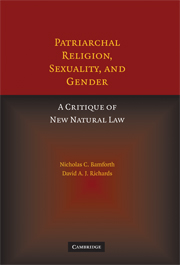Book contents
- Frontmatter
- Contents
- Acknowledgments
- 1 New Natural Law in Context
- 2 Criteria for Evaluating New Natural Law
- 3 The Architecture and Reach of New Natural Law
- 4 Internal Consistency (1): Is New Natural Law Secular?
- 5 Internal Consistency (2): New Natural Law and Thomas Aquinas
- 6 Substantive Appeal (1): What's Wrong with Homophobia and Sexism?
- 7 Substantive Appeal (2): New Natural Law, Sexism, and Homophobia
- 8 Moral Absolutes and the Possible Fundamentalism of New Natural Law
- 9 New Natural Law and Patriarchal Religion
- 10 Concluding Observasions, and Christian Alternatives to New Natural Law
- Bibliography
- Index
10 - Concluding Observasions, and Christian Alternatives to New Natural Law
Published online by Cambridge University Press: 14 August 2009
- Frontmatter
- Contents
- Acknowledgments
- 1 New Natural Law in Context
- 2 Criteria for Evaluating New Natural Law
- 3 The Architecture and Reach of New Natural Law
- 4 Internal Consistency (1): Is New Natural Law Secular?
- 5 Internal Consistency (2): New Natural Law and Thomas Aquinas
- 6 Substantive Appeal (1): What's Wrong with Homophobia and Sexism?
- 7 Substantive Appeal (2): New Natural Law, Sexism, and Homophobia
- 8 Moral Absolutes and the Possible Fundamentalism of New Natural Law
- 9 New Natural Law and Patriarchal Religion
- 10 Concluding Observasions, and Christian Alternatives to New Natural Law
- Bibliography
- Index
Summary
It is now time to draw together the threads of our discussion. In the first section of this concluding chapter, we therefore provide a summary of our criticisms of new natural law and of the new natural lawyers' arguments concerning gender- and sexuality-related issues (both as a general matter and in relation to the law). As we promised in Chapter 2, these criticisms are expressed in terms of our internal consistency and substantive appeal criteria. In the second section, we turn in a rather different direction. It would be easy to conclude this book just with criticisms of new natural law, but we prefer not to do so. As we have tried to make clear, our aim has not been to argue that persons of religious faith should be precluded from contributing to political, ethical, and legal debate within a constitutional democracy: Instead, our concern has been that anyone who seeks to participate should be open about the basis on which they are doing so, and should strive to avoid inconsistencies in their arguments. Furthermore (and whatever our personal views about religion) we have not been seeking to belittle the important role played by religious faith in the lives of countless human beings. This being so, we believe that it would be appropriate to finish by drawing attention to the existence of alternative Christian approaches, which look very different to the conservative doctrines to which the new natural lawyers subscribe.
- Type
- Chapter
- Information
- Patriarchal Religion, Sexuality, and GenderA Critique of New Natural Law, pp. 334 - 370Publisher: Cambridge University PressPrint publication year: 2007

